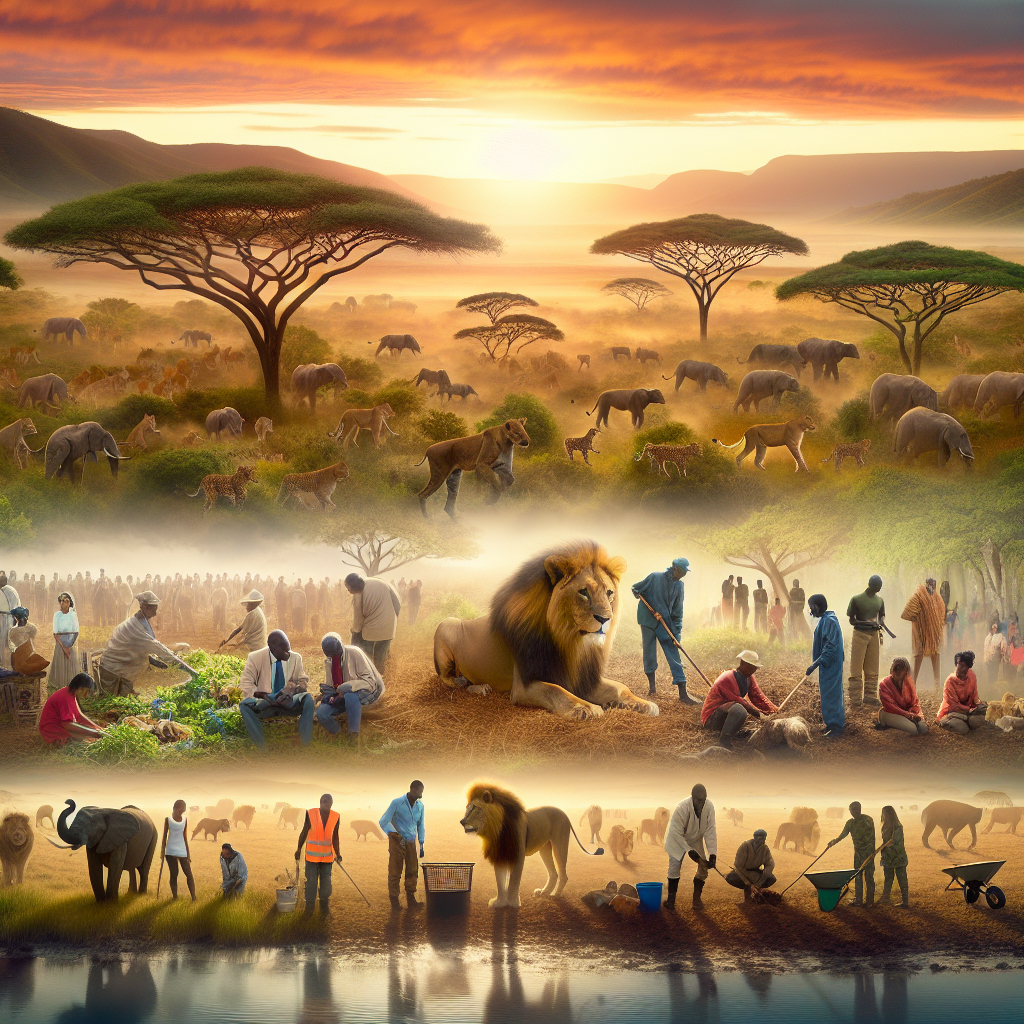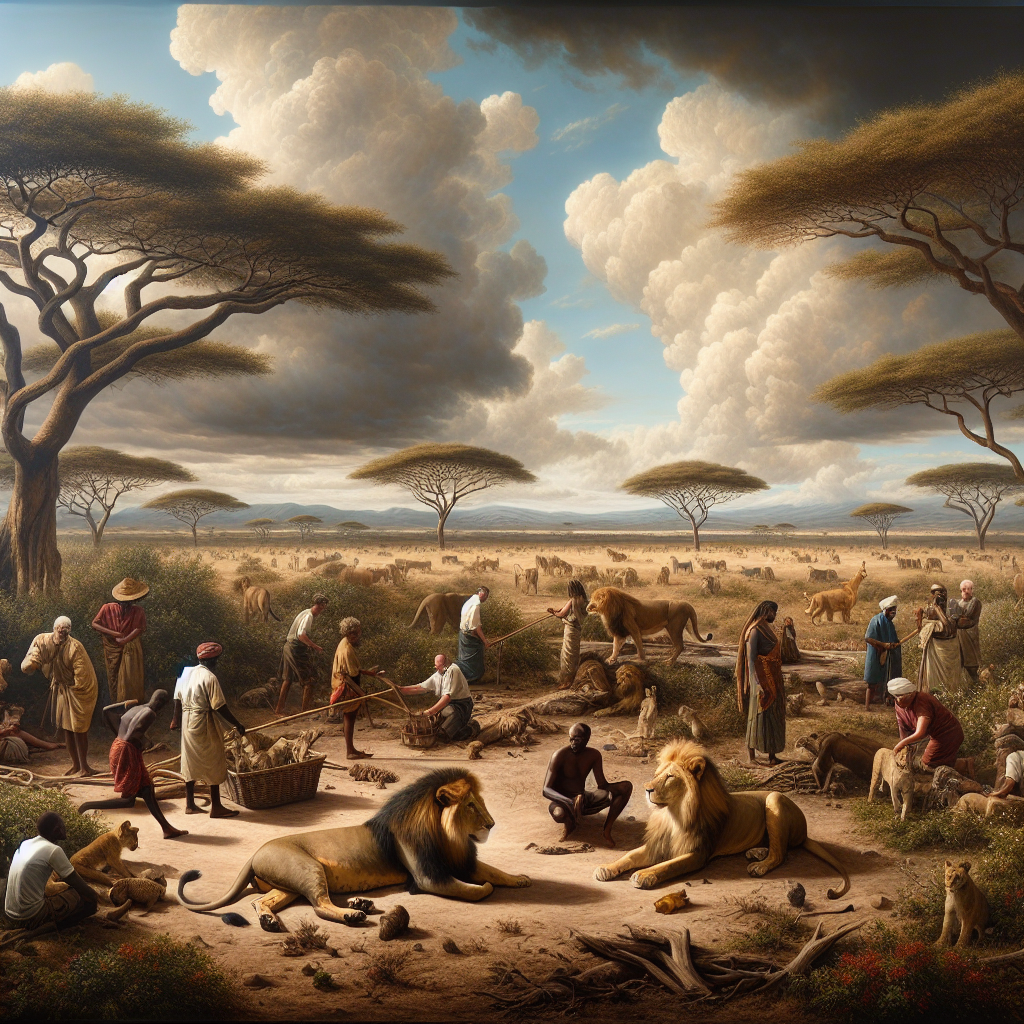Imagine hearing the powerful roar of a lion echo through your backyard, a spine-tingling reminder of the magnificent creatures that once roamed freely in the wild. In the face of escalating threats to their survival, it’s time for local communities to step up and play a pivotal role in saving the king of beasts. From promoting coexistence to supporting conservation initiatives, this article explores the critical actions individuals can take to safeguard the future of lions and ensure generations to come can marvel at their majestic presence.
Understanding the Lion Conservation Crisis
Lions, known as the king of beasts, are facing a grave crisis. The decline of lion populations in recent years has become a matter of concern for conservationists and wildlife enthusiasts alike. The number of lions in Africa has decreased from an estimated 450,000 in the 1940s to just over 20,000 today. This drastic decline calls for urgent action to protect these majestic creatures and ensure their survival for future generations.
The Decline of Lion Populations
Several factors have contributed to the decline of lion populations. One of the main reasons is habitat loss and fragmentation. As human populations expand, lion habitats are being destroyed or converted for agriculture, infrastructure development, and human settlements. The reduction in available space and resources makes it challenging for lions to thrive and reproduce.
Additionally, lion populations face threats from human-wildlife conflict. As lions come into close proximity with human settlements, conflicts arise due to predation on livestock. In response, local communities often retaliate by killing lions to protect their livelihoods. This conflict puts immense pressure on lion populations, leading to further decline.
Reasons Behind the Decline
The decline in lion populations can also be attributed to poaching and illegal wildlife trade. Lions are often targeted for their body parts, which are used in traditional medicine or sold as trophies. The demand for these items perpetuates the illegal wildlife trade, further endangering lion populations.
Furthermore, lack of awareness and empathy towards lions has hindered their conservation efforts. Many people are unaware of the critical role that lions play in maintaining healthy ecosystems. Education and understanding are essential in creating a positive mindset towards lion conservation.

The Importance of Lion Conservation
Lion conservation is not just crucial for the survival of these magnificent animals but also for preserving biodiversity and maintaining ecosystem balance. As apex predators, lions play a vital role in regulating prey populations, preventing overgrazing, and maintaining the natural balance of the ecosystem. Their presence helps maintain the delicate harmony of nature, benefiting all species, including humans.
Moreover, lions hold significant cultural and economic value for local communities. They are often seen as symbols of power, strength, and heritage in many African cultures. The decline of lion populations would lead to the loss of these cultural values and traditions, impacting the identity and pride of local communities. Additionally, lions contribute to eco-tourism, attracting visitors from around the world and boosting the local economy. The conservation of lions can thus have a positive impact on the livelihoods and well-being of local communities.
The Role of Local Communities in Lion Conservation
Recognizing the Connection
Local communities are at the forefront of lion conservation efforts. They have a deep connection with the land and wildlife, making them key stakeholders in preserving lion populations. By involving local communities in conservation initiatives, we can ensure their active participation and garner their support for the protection of lions.
Benefits of Lion Conservation for Local Communities
Lion conservation can bring numerous benefits to local communities. By protecting lions and their habitats, we can promote sustainable ecotourism, which generates revenue and job opportunities for the community. Additionally, initiatives such as education programs, capacity building, and training can empower local communities to become actively involved in conservation efforts. These initiatives not only provide valuable skills and knowledge but also create a sense of ownership and pride in protecting their natural resources.
Challenges Faced by Local Communities
However, local communities face several challenges when it comes to lion conservation. Poverty, lack of education, and limited access to resources can hinder their ability to engage effectively in conservation efforts. In conflicts between lions and local communities, loss of livestock can have severe economic impacts, leading to tensions and animosity towards conservation initiatives. It is crucial to address these challenges through targeted interventions that address poverty alleviation, education, and alternative livelihood options.
Creating Awareness and Empathy
Education Programs in Local Communities
Education plays a vital role in fostering awareness and empathy towards lions. Implementing education programs at the local level can help spread knowledge about lion behavior, ecological importance, and the challenges they face. Schools, community centers, and outreach programs can be utilized to educate children and adults alike about the significance of lion conservation and the need to coexist with wildlife.
Promoting Understanding and Empathy towards Lions
Creating empathy towards lions involves changing mindsets and attitudes towards these majestic creatures. We can promote understanding and empathy by highlighting the importance of lions in maintaining healthy ecosystems and showcasing their beauty and unique characteristics. Platforms such as documentaries, wildlife photography, and social media can be utilized to capture the hearts and minds of people, inspiring them to support lion conservation efforts.

Protecting Lion Habitats
Identifying and Preserving Key Lion Habitats
Preserving lion habitats is crucial for their survival. Identifying key lion habitats and implementing measures to protect and restore them is essential. This involves mapping and monitoring lion populations, understanding their movement patterns, and identifying critical areas for conservation. By establishing protected areas and declaring them as lion conservation zones, we can ensure the long-term security of these habitats.
Establishing Protected Areas and Wildlife Corridors
Protected areas serve as safe havens for lions, enabling them to roam freely and breed without human interference. Alongside protected areas, establishing wildlife corridors is instrumental in connecting fragmented habitats and allowing genetic exchange between lion populations. These corridors create a network of safe passage for lions, reducing the risk of inbreeding and enhancing their long-term survival prospects.
Mitigating Human-Wildlife Conflict
Managing Livestock Predation
Addressing human-wildlife conflict is essential for fostering peaceful coexistence between local communities and lions. Implementing measures to mitigate livestock predation, such as using guardian animals or employing community-based monitoring systems, can reduce the economic impact on communities and decrease retaliatory killings of lions. These strategies help minimize conflict and provide a sustainable solution for both humans and lions.
Implementing Effective Fence and Enclosure Systems
Developing effective fence and enclosure systems can prevent lions from entering human settlements and livestock areas, reducing the chances of conflict. By utilizing innovative techniques such as electrified fences, reinforced enclosures, or thorny barriers, we can create a physical barrier that protects both humans and lions. Community engagement and participation are crucial in implementing these measures successfully.
Promoting Sustainable Land Use Practices
Encouraging Sustainable Agriculture
Promoting sustainable agricultural practices is essential to ensure the coexistence of lions and local communities. By adopting techniques such as rotational grazing, agroforestry, and water conservation, we can minimize the impact of agriculture on lion habitats. These practices not only contribute to the conservation of lions but also improve soil fertility, enhance crop yields, and ensure food security for local communities.
Reducing Habitat Fragmentation
Habitat fragmentation poses a significant threat to lion populations. Initiatives to reduce habitat fragmentation involve promoting land-use planning that considers wildlife corridors, buffer zones, and conservation easements. By maintaining connectivity between habitats, we can safeguard wildlife movement and genetic diversity, supporting the long-term survival of lion populations.
Supporting Eco-tourism Initiatives
Eco-tourism can serve as a valuable tool for lion conservation and community development. By supporting eco-tourism initiatives, local communities can benefit from sustainable tourism practices that provide economic incentives for conserving lion habitats. This can include developing community-based tourism enterprises, promoting cultural exchange programs, and ensuring that revenue from tourism directly benefits conservation efforts.
Community-Based Conservation Initiatives
Engaging Local Communities in Conservation Efforts
Engagement and empowerment of local communities are crucial for successful lion conservation. Involving local communities in decision-making processes, creating community-led conservation initiatives, and establishing partnerships between conservation organizations and indigenous peoples are essential steps. This participatory approach allows local communities to take ownership of conservation efforts and ensures that their traditional knowledge and practices are respected.
Collaborating with Indigenous Peoples and Local Leaders
Indigenous peoples and local leaders have a wealth of knowledge and experience when it comes to conservation. Collaborating with them and recognizing their rights and contributions can strengthen lion conservation efforts. By incorporating traditional ecological knowledge, cultural practices, and ancestral wisdom, we can create a holistic and inclusive approach to lion conservation that respects the values and traditions of local communities.
Supporting Anti-Poaching Measures
Enhancing Wildlife Law Enforcement
Poaching remains a significant threat to lions, and combating it requires robust wildlife law enforcement. Strengthening legal frameworks, increasing penalties for wildlife crimes, and providing training and resources to law enforcement agencies are crucial steps in deterring poaching. By improving surveillance, intelligence gathering, and prosecutions, we can make a significant impact in curbing the illegal hunting and trade of lions.
Establishing Anti-Poaching Units
The establishment of specialized anti-poaching units can enhance on-the-ground efforts to combat poaching. These units, consisting of trained rangers and conservationists, play a vital role in patrolling protected areas, monitoring lion populations, and apprehending poachers. Additionally, these units can work collaboratively with local communities, building trust and fostering cooperation in the fight against poaching.
Encouraging Responsible Tourism
Promoting Ethical Wildlife Tourism Practices
Responsible tourism practices are essential for minimizing the negative impact of tourism on lion populations and their habitats. Responsible tour operators should adhere to strict ethical guidelines, such as maintaining a safe distance from lions, avoiding disturbance to their natural behaviors, and supporting conservation initiatives financially. By choosing responsible tour operators and engaging in ethical wildlife tourism, visitors can contribute to lion conservation while enjoying a memorable and authentic experience.
Ensuring Tourist Revenue Benefits Conservation
Tourism revenue can be a valuable source of funding for lion conservation efforts. It is crucial to ensure that a significant portion of the revenue generated from tourism activities goes directly towards lion conservation initiatives and supporting local communities. Transparency in revenue distribution and collaboration between tourism operators, local communities, and conservation organizations can ensure that tourism benefits both the economy and the environment.
Identifying Policy and Legislation Gaps
Advocating for Stronger Conservation Laws
The conservation of lions requires a robust legal framework that protects them from threats such as poaching, habitat loss, and human-wildlife conflicts. Advocating for stronger conservation laws, tighter regulations on wildlife trade, and the enforcement of existing legislation is crucial. By working with policymakers, conservation organizations, and local communities, we can ensure that adequate legal protections are in place for the survival of lions.
Addressing Issues in Wildlife Trade
The illegal wildlife trade is a major driver of lion population decline. Addressing issues in wildlife trade requires international collaboration, strengthened borders, and increased law enforcement efforts. Raising awareness about the consequences of wildlife trade and supporting community-based alternative livelihood initiatives can help combat this issue effectively.
In conclusion, lions are in dire need of our attention and concerted efforts. By understanding the challenges they face and recognizing the crucial role of local communities, we can initiate effective conservation measures to ensure the survival of these majestic creatures. Through awareness, empathy, sustainable land use practices, community engagement, anti-poaching measures, responsible tourism, and strong policy support, we can strive towards a future where lions continue to roam the savannahs, inspiring awe and admiration in all those who encounter them. Let us join forces and do everything in our power to save the king of beasts from the brink of extinction.

